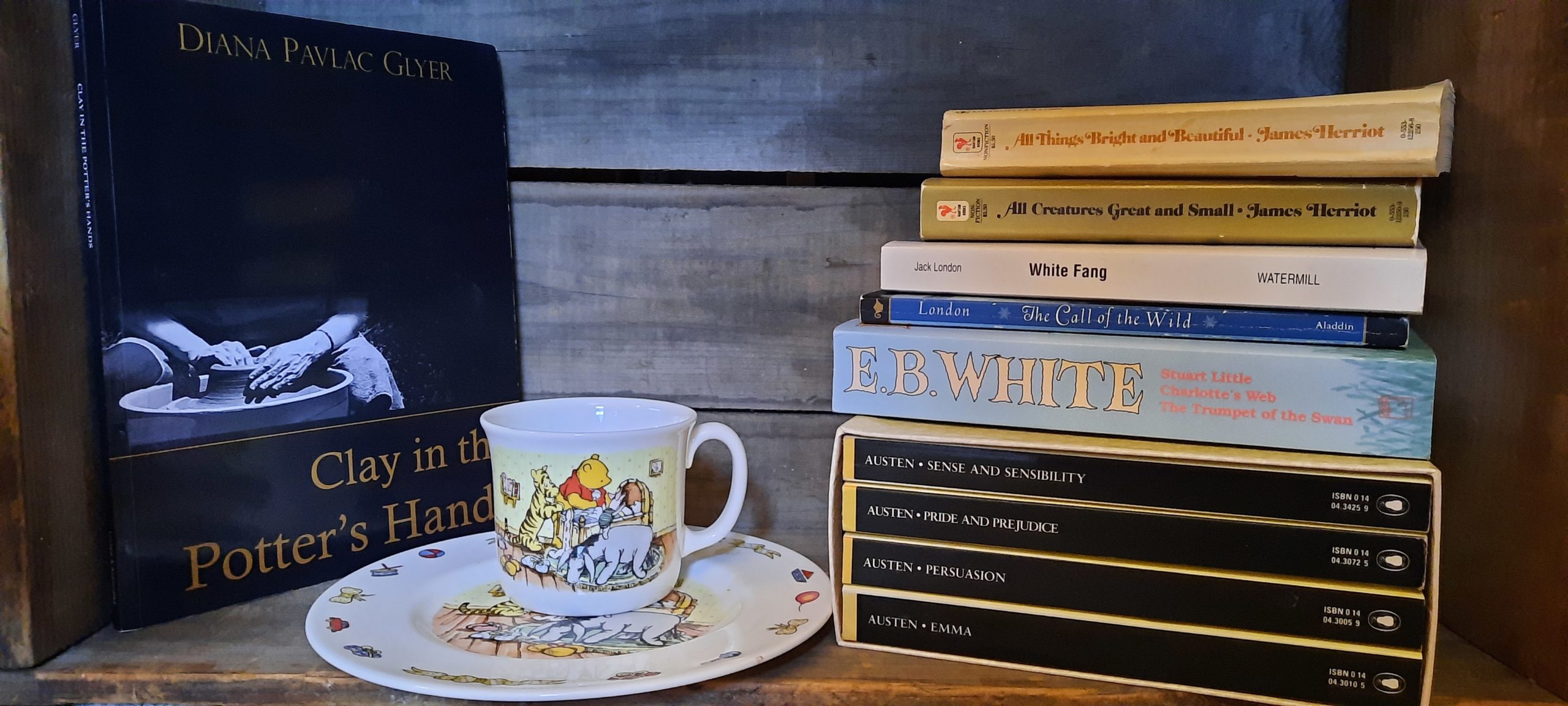“It was June, and the world smelled of roses. The sunshine was like powdered gold over the grassy hillside.”
— Maud Hart Lovelace, Betsy-Tacy and Tib
One of my fondest memories of childhood was visiting the libraries in the summer. I especially loved the library in my elementary school because I could walk there rather than ask my mom to drive me to the public library. We lived down the block from Halverson Elementary, so I could visit as much as I liked and chat with the librarian as I searched the stacks — the library was even open to check out books in summertime.
There was a certain mystery to a school library staying open when the rest of the building was closed. The air smelled like floor wax and cleaners due to the custodians who re-waxed the floors to a mirror finish after a busy year. The only sounds came from the typewriter in the office and a grownup voice or two. I walked in and instinctively knew what shelves held my favorites: Charlotte’s Web and the Pippi Longstocking series. If they were checked out, I’d search for the classics from Jack London, Dr. Seuss, or James Herriot. Then I would pencil my name on the library card and the librarian would take that amazing date stamper (Do you remember those? You turned the little cog to dial in the right date.) and stamp the book’s due date slip.
When I got home, I’d dump my book stack on my bed under the window, the warm breezes gently ruffling the curtains while I read. Pippi made me laugh to tears and I remember marveling at her bravery and courage — after all, this young, pigtailed girl lived alone with her horse and a monkey named Mr. Nilsson. Charlotte’s Web taught me about friendship and doing valiant things for those you loved. Jack London’s The Call of the Wild and White Fang transported me into the wilderness, where stories of grit and determination were brought to life through the eyes of dogs. Each story expanded my world and imagination.
The common threads running through these classic stories are fortitude and courage. Honestly, even Dr. Seuss’s tales included this theme in a simple way. Virtue is embodied in characters like Horton and the Lorax. By reading good literature from a young age, we gradually become perceptive to the feelings of those around us, gathering in the consequences of good or unwise choices, forming our character over time.
I encourage you to wander through your local library this summer and ask the librarians (they are so very helpful and can suggest additional books) to help you track down the classics that I’ve mentioned. Go ahead and check out Pippi or Maud Hart Lovelace’s series for yourself or read them aloud to the children in your life. These books are classics for a reason. I wholeheartedly agree with C.S. Lewis, who wrote, “…it certainly is my opinion that a book worth reading only in childhood is not worth reading even then.”[1]
I often refer to C.S. Lewis because his essays speak truth about the heart of what makes for a good read.
The children’s books that I’ve mentioned in the beginning of this essay are timeless stories embodying the qualities of life that are meaningful to a child and an adult. In his essay “On Three Ways of Writing for Children,” Lewis informs us about his own writing, “I put in what I would have liked to read when I was a child and what I still like reading now that I am in my fifties.”[2] The Narnian tales and Charlotte’s Web delight all ages because they speak of the human experience in a natural, and sometimes supernatural, way. Each time we return to a good story that we’ve read before, we catch something new — perhaps a coming-of-age moment, a relatable experience, or a confirmation. A familiar, beloved book is always new again.
The good reading we do as children guides us into what we read as adults. Perhaps our preference of genre may change, but our desire to read well-written texts does not. The implicit and explicit lessons we glean from Jane Austen aid us in our modern-day relationships. Perhaps you enjoyed the Keys for Kids devotionals (teaching beauty with brevity!) when you were young, and now you would love a study that speaks to your heart in a fresh and relatable way. And as we have read in Pippi and the Betsy-Tacy books, life is full of challenges. As we get older, our challenges get messy, confusing, and sometimes painful. A grownup story can minister to our hearts and let us know that we are not alone in our soul-ache. Cultivating warmly offers you the following resources that can expand your experiences with our recommended literature for the summer.
Karen Swallow Prior explains the importance of reading and what it teaches us in this Trinity Forum feature. The interview begins with a discussion about Jane Austen’s writing, but continues to examine the use of satire, literacy, virtue, and the author writing as a moral philosopher. She will also share great book suggestions too! This interview will be the best hour of your day.
“Reading Jane Austen: A Novel Approach to Virtue,” Trinity Forum Online, Conversation, May 21, 2021.
Finding a devotional that really connects with a creative heart and mind is a special delight. Clay in the Potter’s Hands by Diana Pavlac Glyer is a fifteen-day guide applying the metaphor of God as the Potter and you as the clay. The beautiful photographs of the process of clay work help the reader to visualize the process of growth and maturation of our souls. Glyer writes, “God uses the language of pots, pottery, and pottery makers throughout the Old and New Testaments. What is there to know about this important metaphor? The more we know about clay, the richer and more inspiring this image becomes.”
To learn more about the devotional in Diana’s own words, read her interview right here in Cultivating!
Interview with Diana Pavlac Glyer – Clay in the Potter’s Hands
Sarah Clarkson‘s newest book This Beautiful Truth is a recommended book for summer. She writes hope and healing to a world that is broken by telling us her own story of mental illness and the healing she has found in the redeeming power and beauty of our great God. You can read her exclusive interview about The Beautiful Truth right here in this issue of Cultivating. Additionally, you can get to know Sarah better and her prior writing in this superb past interview in Cultivating. She shares about her story, Book Girl, and how reading has been critically formative to her life. Clarkson tells us that she wrote her story not to create a “pedantic or directive work, but rather something more in the vein of a memoir with book lists, a witness to the comfort and grace of the reading life…” She is a gifted writer of “books about books.”
Finally, hear the voices of authors and artists who came together to tell the story of God’s faithfulness in and through the women of the Bible. This wonderful fellowship blends visual arts, song, and story to show God’s presence in a powerful way. The Faithful Project features a book and an album of soul-lifting music called Faithful: Go and Speak! Look for a podcast coming soon. This project includes the talents of Amy Grant, Ellie Holcomb, Christa Wells, and many more. Click here for the link to the site with trailers and more.
This is a taste of the beauty you will find.
“Have I not commanded you? Be strong and courageous. Do not be frightened, and do not be dismayed, for the Lord your God is with you wherever you go.” — Joshua 1:9 ESV
The featured image is courtesy of Annie Nardone and used with her permission for Cultivating and The Cultivating Project.
[1] C.S. Lewis, “Sometimes Fairy Stories May Say Best What’s to be Said,” in On Stories (New York: HarperOne, 2017), 71.
[2] C.S. Lewis, “On Three Ways of Writing for Children,” in On Stories (New York: HarperOne, 2017), 46.
Annie Nardone is a lifelong bibliophile with a special devotion to the Inklings and medieval authors. She is a Fellow with the C.S. Lewis Institute and holds an M.A. in Cultural Apologetics from Houston Christian University. Annie is the Director of Visual Artists for The Cultivating Project and columnist for Cultivating Magazine. She is founding board member, managing editor, and author for the apologetics quarterly, An Unexpected Journal. Her writing can also be found as travel blogger for Clarendon Press U.K., with published poems at Calla Press and Poetica.
She holds a MA in Cultural Apologetics from Houston Christian University, and is a Fellow with the C.S. Lewis Institute. Annie writes for Cultivating, Literary Life, and Clarendon House Books, and is a managing editor and writer for An Unexpected Journal. Annie collaborated on three books in 2022, published by Square Halo Books and The Rabbit Room. She recently designed a curriculum detailing the intersection of theology, the arts, and history and is a Master Teacher for HSLDA. She resides in Florida with her Middle Earth/Narnia/Hogwarts-loving family, and an assemblage of sphynx cats and feline foundlings.
Leave a Reply
A Field Guide to Cultivating ~ Essentials to Cultivating a Whole Life, Rooted in Christ, and Flourishing in Fellowship
Enjoy our gift to you as our Welcome to Cultivating! Discover the purpose of The Cultivating Project, and how you might find a "What, you too?" experience here with this fellowship of makers!


Add a comment
0 Comments